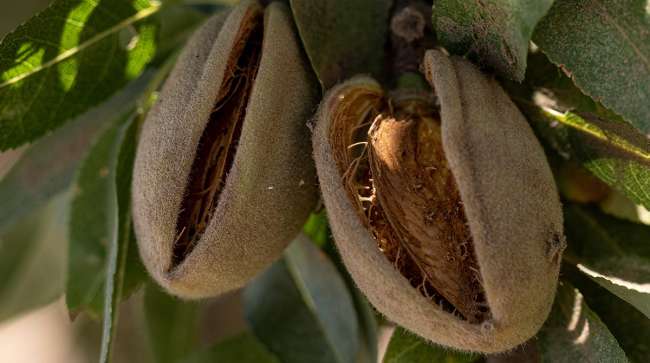Almonds growing on a tree in Firebaugh, Calif. Almonds top the list of California farm exports. (David Paul Morris/Bloomberg)
Gov. Gavin Newsom said he’s seeking exemptions for California-made products from retaliatory tariffs and wants to open talks with global allies over new trade relationships, casting the state as a buffer against the fallout of Donald Trump’s sweeping tariff plan.
In a post on X on April 4, Newsom said that he has directed his administration to reassure allies that “California remains a stable trading partner,” even as Trump pushes for a 10% across-the-board tariff on imports and steeper tariffs for some nations.
When contacted for comment, Newsom’s office declined to provide specifics on outreach to countries or policies his administration is pursuing. They also didn’t provide additional details on how California would navigate the constitutional limits on states negotiating their own trade terms. While Newsom cannot enter binding international agreements with foreign nations, the governor can pursue informal partnerships and export promotion efforts such as state-led trade missions.
California accounts for roughly 14% of the nation’s gross domestic product and ranks as the fifth-largest economy in the world. Newsom said that economic weight — paired with the state’s population of 40 million — gives California leverage on the global stage.
I’m pursuing trading relationships with our global partners to combat the pain of Trump’s tariffs and exclude California-made products from retaliation.
As the world’s 5th largest economy, California remains open for business — no matter the turbulence in Washington. pic.twitter.com/c9UtoTvN10
— Governor Newsom (@CAgovernor) April 4, 2025
But it also makes California more vulnerable to global trade disruptions, particularly as major U.S. trading partners begin to retaliate. On April 4, China announced it would impose a 34% tariff on all U.S. imports starting April 10, mirroring the rate of Trump’s proposed “reciprocal” tariffs. A day earlier, Canada said it would tax U.S. auto imports in response to Trump’s move to slap new tariffs on foreign-made cars.
The state is a key player in agriculture and U.S. manufacturing, including semiconductors, computer equipment and vehicles — sectors that are being targeted in the trade dispute.
California exported $24 billion in agricultural goods in 2022, nearly 13% of total U.S. farm exports. Almonds topped the list at $4.7 billion, followed by dairy products, pistachios and wine. Top buyers include Canada, the European Union, China and Hong Kong.
In the X post, Newsom linked to a Fox News report citing a senior administration official who said the state is concerned about rising rebuilding costs after January’s wildfires around Los Angeles and the potential for trade disruptions in the California-Baja border region.
Much of the manufacturing in that area depends on cross-border supply chains, where components often travel back and forth between factories several times before becoming finished products.






